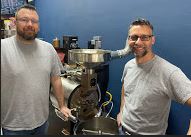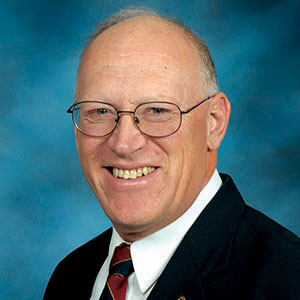Kansas Profile – Now That’s Rural: Ray Ford and Joel Heath, Burr Roasters
July 28, 2021
By Ron Wilson, director of the Huck Boyd National Institute for Rural Development at Kansas State University
Not all coffees are created equal. Today we’ll meet a couple of artisan coffee roasters who have learned the truth of this statement and applied it to their remarkable coffee business.
Ray Ford and Joel Heath are the makers of this remarkable coffee. They are co-owners of Burr Roasters & Cafe in Leavenworth.
Ray Ford grew up in Kentucky and joined the Army. “I grew up with bad coffee,” Ray said. “Everybody drinks coffee in the field,” he said. “(The coffee is) warm and you’re cold.” Soldiers drank whatever coffee was provided.
Ray took a job in retail which included working in a coffee shop. “I got a knack for it,” Ray said.

At right: Ray Ford and Joel Heath
Ray learned that there is a distinct science related to making really good coffee. It became clear that not all coffee is created equal. Part of the key to quality is producing it in small batches, rather than mass production. Another factor is insisting on beans that are fresh. A third is sourcing the right kind of coffee beans. Ray works closely with his suppliers to ensure they acquire the best possible blends. Burr Roasters carefully sources its coffee from selected locations in Brazil, Colombia and Ethiopia.
“Different elevations and different soil contents produce different flavors,” Ray said. “There’s a whole science behind it.” Ray and Johnny experimented with various blends, gave them away to friends, and developed their favorites.
Then they made a fascinating historic discovery which connected them to their Army roots. They learned that, from 1916 to 1956, the U. S. Army employed its own team of master coffee roasters to meet the massive coffee demand from soldiers around the world. There were several Army coffee production facilities across the nation, including the largest at a location called Warehouse 310 in Atlanta. Then, in the interest of efficiency and economy, the Army switched to commercial mass-produced sources of coffee in the 1950s.
Ray and Johnny found a 1956 book titled “Coffee in the Armed Forces” which included various blends and coffee-making tips. After some experimenting, they found the coffee was terrific and they adapted it into their business. Eventually, Johnny’s interest in the business was purchased by fellow Army veteran Joel Heath, who is now the chief roaster.
Today, Burr Roasters & Café serves fresh coffee at their coffee shop, delivers locally and produces roasted coffee blends for sale and shipment. One popular variety is based on the classic Army recipes. It is named Warehouse 310, in honor of what had been the Army’s leading coffee facility. “It’s a fantastic bag of coffee,” Johnny said. “It’s smooth, mild, warm and hazelnutty.”
Burr Roasters & Cafe offers another blend called IV Drip, a highly caffeinated coffee which is popular with first responders and night-shift hospital workers. They also offer an Ethiopian blend called Lion of Judah, plus blends named 0 Dark Thirty, Texas Pecan, Choconut and an espresso called Pony Espresso. Ray’s daughter bakes cookies and scones for the business.
In addition to the local retail trade, Burr Roasters & Cafe serves wholesale customers. One is a coffeehouse in the rural community of Haviland, population 701 people. Now, that’s rural. Burr Roasters also ships its coffee blends coast to coast and as far away as England and Afghanistan.
“We always use fresh beans. People have told us how much of a difference it makes,” Ray said. “My most rewarding element is how happy people can get from having a cup of coffee. We take care of our customers, and they come back.”
For more information, visit their website.
Not all coffee is created equal. We commend Ray Ford and Joel Heath of Burr Roasters & Café or making a difference with craftsmanship in coffee while connecting with their Army roots. Some say their type of coffee is unequaled.
Audio and text files of Kansas Profiles are available at http://www.kansasprofile.com. For more information about the Huck Boyd Institute, interested persons can visit http://www.huckboydinstitute.org.
***
The mission of the Huck Boyd National Institute for Rural Development is to enhance rural development by helping rural people help themselves. The Kansas Profile radio series and columns are produced with assistance from the K-State Research and Extension Department of Communications News Media Services unit. A photo of Ron Wilson is available at http://www.ksre.ksu.edu/news/sty/RonWilson.htm. Audio and text files of Kansas Profiles are available at http://www.kansasprofile.com. For more information about the Huck Boyd Institute, interested persons can visit http://www.huckboydinstitute.org.


